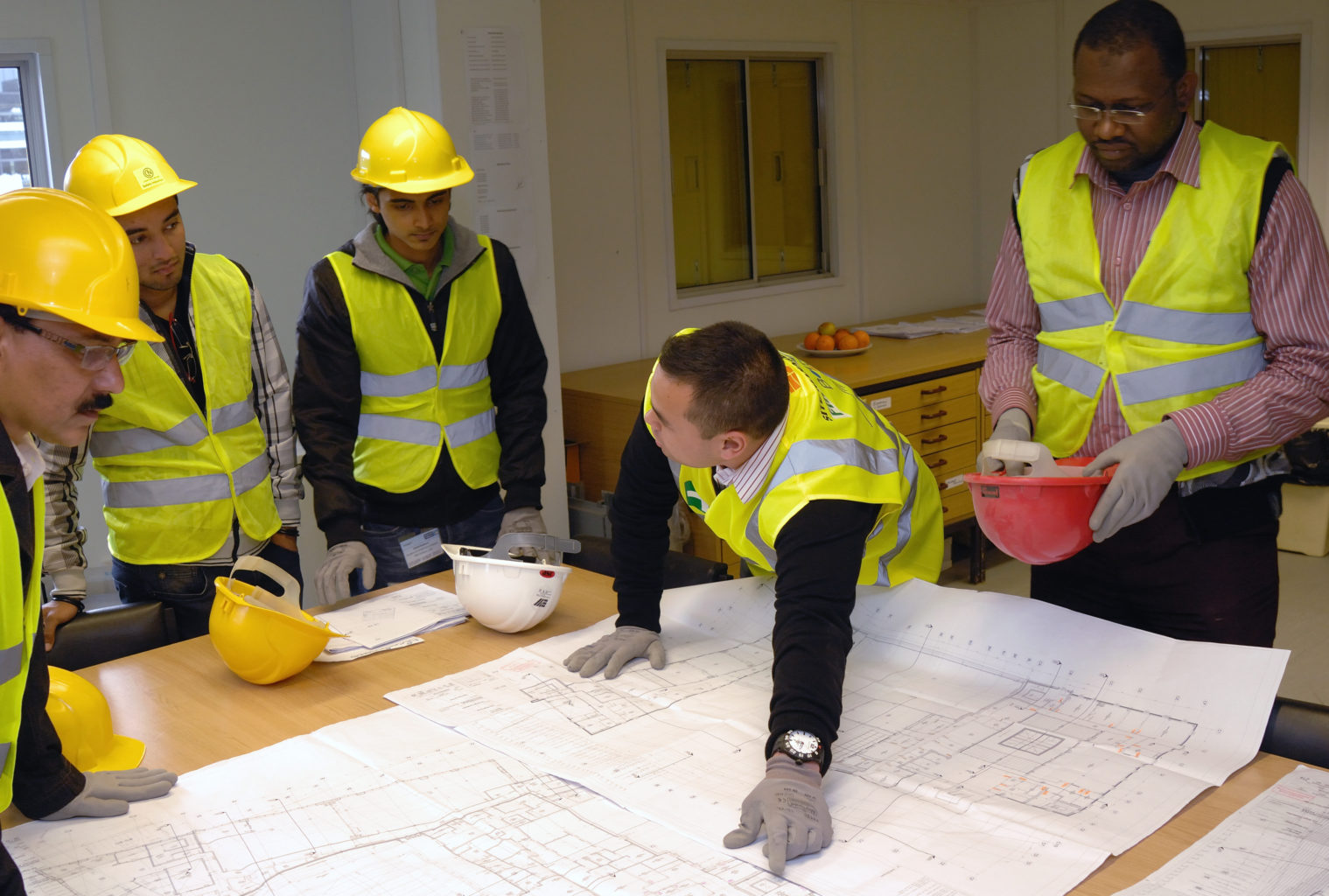Home>diy>Building & Construction>What Degree Do You Need To Be A Project Manager In Construction


Building & Construction
What Degree Do You Need To Be A Project Manager In Construction
Modified: October 21, 2024
Discover the essential degree required for a successful career as a project manager in building construction. Enhance your prospects with this informative guide.
(Many of the links in this article redirect to a specific reviewed product. Your purchase of these products through affiliate links helps to generate commission for Storables.com, at no extra cost. Learn more)
Introduction
Building construction is a complex and intricate process that requires careful planning, coordination, and management. At the heart of this process is the role of a project manager in construction, a key figure responsible for overseeing the successful completion of construction projects.
Project managers in construction are tasked with a wide range of responsibilities, from conceptualizing and planning projects to coordinating resources and ensuring quality control. They play a vital role in bridging the gap between the client’s vision and the actual construction process, ensuring that everything runs smoothly and efficiently.
But what does it take to become a project manager in construction? What skills and knowledge are necessary in this demanding field? And perhaps most importantly, what degree is needed to embark on a successful career as a project manager in construction?
In this article, we will explore the role of a project manager in construction, the required skills and knowledge, and the importance of obtaining a degree in construction management. We will also discuss alternative degrees and certifications that can be beneficial for aspiring project managers in the construction industry. By the end, you will have a clear understanding of the educational path and qualifications needed to excel in this dynamic field.
Key Takeaways:
- A degree in construction management provides a structured foundation of knowledge and skills crucial for success in the construction industry. It offers a comprehensive understanding of construction principles, project management, and the latest industry trends.
- Professional certifications and additional training, such as PMP, CCM, and LEED AP, further enhance the skillset and marketability of project managers in construction. They demonstrate commitment to professional development and validate expertise in the field.
The Role of a Project Manager in Construction
A project manager in construction is like the conductor of an orchestra, overseeing every aspect of a construction project to ensure its successful completion. They are responsible for both the planning and execution phases, as well as the ongoing coordination and management of resources.
One of the primary responsibilities of a project manager is to develop a detailed project plan. This involves creating a comprehensive timeline, setting project goals, and estimating the required budget and resources. They work closely with architects, engineers, and other stakeholders to ensure that the project’s scope and objectives are clearly defined.
Throughout the construction process, a project manager must continuously monitor progress and evaluate performance. They coordinate and communicate with various teams, subcontractors, and suppliers to ensure that work is completed as scheduled and meets quality standards. They also manage any changes or challenges that may arise, making necessary adjustments to keep the project on track.
Effective communication is a crucial aspect of the project manager’s role. They must liaise with clients to address their concerns, provide regular updates, and ensure that their expectations are being met. They also collaborate with a wide range of professionals, such as architects, engineers, and construction workers, facilitating effective communication between all parties involved.
Risk management is another key responsibility of a project manager in construction. They must identify potential risks and develop strategies to mitigate them. This includes anticipating and addressing any safety hazards, ensuring compliance with building codes and regulations, and maintaining a safe working environment for the entire construction team.
Overall, a project manager in construction plays a vital role in ensuring the successful completion of a construction project, from start to finish. Their ability to multitask, problem-solve, and manage resources effectively is essential in delivering high-quality projects on time and within budget.
Required Skills and Knowledge for a Project Manager in Construction
Being a successful project manager in construction requires a diverse range of skills and knowledge. In addition to technical expertise, project managers must possess strong communication, leadership, and problem-solving skills to navigate the complexities of the construction industry.
First and foremost, project managers in construction must have a solid understanding of the construction process and industry standards. This includes knowledge of architectural and engineering principles, building codes and regulations, and construction methodologies. Familiarity with construction materials, tools, and equipment is also essential for effective decision-making and resource management.
Communication skills are vital for project managers to effectively convey information and instructions to various stakeholders. They must be able to communicate clearly and concisely with clients, architects, engineers, contractors, and construction workers. Strong interpersonal skills are also necessary for building relationships and resolving conflicts that may arise during the course of a project.
Leadership is a critical skill for project managers in construction. They must be able to effectively delegate tasks, motivate team members, and handle project-related challenges with confidence and composure. Strong leadership qualities help in maintaining team morale and fostering a collaborative work environment, which is crucial for the successful completion of construction projects.
A project manager in construction must possess excellent problem-solving and decision-making skills. They are often required to make quick and accurate decisions, especially when facing unexpected challenges or changes in project requirements. The ability to think critically and find creative solutions is key to overcoming obstacles and keeping the project on track.
Time management and organizational skills are also vital for project managers in construction. They must be able to effectively prioritize tasks, manage multiple projects simultaneously, and ensure that projects are completed within the specified timelines. Attention to detail is crucial in overseeing the quality of work and ensuring compliance with project specifications.
Lastly, project managers in construction must stay updated with the latest technological advancements and industry trends. This includes familiarity with project management software, building information modeling (BIM), and other tools that can streamline project workflows and improve efficiency.
Having a combination of these skills and knowledge is essential for project managers in construction to effectively plan, execute, and manage construction projects, delivering them successfully to clients’ satisfaction.
Importance of a Degree in Construction Management for Project Managers
Obtaining a degree in construction management can significantly enhance a project manager’s career prospects and effectiveness in the construction industry. While experience and on-the-job training are valuable, a formal education in construction management provides a structured foundation of knowledge and skills that are crucial for success in this field.
One of the key advantages of a degree in construction management is the comprehensive understanding it offers of the construction process. Through coursework and practical training, students gain in-depth knowledge of construction principles, techniques, and best practices. This knowledge equips them with the ability to analyze and evaluate construction projects from a holistic perspective, ensuring efficient project planning and execution.
In addition, a degree in construction management provides project managers with a solid understanding of project management principles and methodologies. They learn how to develop project plans, estimate budgets and resources, manage risks, and implement effective project controls. This knowledge is invaluable in coordinating and managing construction projects, ensuring they are completed on time, within budget, and to the required quality standards.
Furthermore, a degree in construction management helps project managers develop strong leadership and communication skills. The curriculum often includes courses on teamwork, conflict resolution, and effective communication, which are essential for managing diverse teams and stakeholders in the construction industry. Effective communication and leadership abilities enable project managers to keep the entire project team aligned, motivated, and focused on achieving project goals.
Another advantage of a degree in construction management is the exposure it provides to the latest technological advancements in the industry. Students learn about emerging technologies such as Building Information Modeling (BIM), construction software, and project management tools. This knowledge allows project managers to adapt and leverage these technologies to streamline processes, improve collaboration, and increase project efficiency.
Beyond the technical skills and knowledge, a degree in construction management also demonstrates a level of commitment and professionalism to potential employers. It signals that the individual has invested time and effort in acquiring the necessary qualifications to excel in their role. Many employers prefer to hire project managers with formal education in construction management as it reflects their dedication and ability to handle complex construction projects.
Ultimately, a degree in construction management provides project managers with a solid foundation of knowledge, skills, and credentials that are highly valued in the construction industry. It enhances their career opportunities, improves their effectiveness in managing construction projects, and positions them as competent and reliable professionals in the field.
A degree in construction management, civil engineering, or a related field is typically required to become a project manager in construction. It’s also beneficial to gain experience through internships or entry-level positions in the industry.
Alternative Degrees for Project Managers in Construction
While a degree in construction management is highly beneficial for project managers in the construction industry, there are alternative degree paths that can also lead to a successful career in this field. These alternative degrees provide a different perspective and skill set that can complement construction management knowledge, opening up additional opportunities for project managers.
1. Civil Engineering: A degree in civil engineering provides a strong foundation in engineering principles, structural analysis, and design. This degree equips project managers with a deep understanding of construction materials, structural integrity, and technical aspects of the construction process. The combination of construction management and civil engineering expertise allows project managers to oversee complex construction projects with a more technical focus.
2. Architecture: An architecture degree provides a comprehensive understanding of design principles, architectural theory, and building systems. Project managers with a background in architecture have a unique perspective on construction projects, as they can collaborate effectively with architects, interpret architectural drawings, and ensure construction plans align with design intent. This combination of construction management and architectural knowledge enables project managers to manage the construction process while maintaining design integrity.
3. Business Administration: A degree in business administration provides project managers with a solid foundation in management principles, finance, marketing, and organizational behavior. This degree equips project managers with essential skills in strategic planning, budgeting, and resource management. With a business administration background, project managers can effectively handle project budgets, negotiations, and client management, expanding their expertise beyond technical aspects.
4. Project Management: A degree specifically focused on project management provides project managers with a comprehensive understanding of project management methodologies, tools, and techniques. While construction management degrees encompass project management principles, a specialized project management degree offers a broader perspective that can be applied across various industries. Project managers with this degree have a strong grasp of project planning, scheduling, risk management, and leadership skills that can be seamlessly applied to construction projects.
5. Construction Engineering: A degree in construction engineering combines elements of civil engineering and construction management, focusing on the technical and structural aspects of construction projects. This degree provides project managers with a deeper understanding of construction materials, equipment, and project execution techniques. The specialized knowledge in construction engineering enhances their ability to oversee complex projects and make strategic decisions related to construction processes and systems.
While a degree in construction management remains the most direct path for project managers in the construction industry, these alternative degrees offer valuable skills and knowledge that can complement and enhance a project manager’s capabilities. The choice of an alternative degree depends on one’s specific interests, career goals, and the desired focus within the construction industry.
Professional Certifications and Additional Training for Project Managers in Construction
In addition to a degree in construction management or a related field, obtaining professional certifications and pursuing additional training can further enhance the skillset and marketability of project managers in the construction industry. These certifications and training programs provide specialized knowledge and validate the expertise of project managers, demonstrating their commitment to professional development and excellence.
1. Project Management Professional (PMP): The PMP certification, offered by the Project Management Institute (PMI), is one of the most widely recognized certifications in the field of project management. It validates the knowledge and skills of project managers across various industries, including construction. The PMP certification focuses on project management methodologies, processes, and best practices, and requires passing an exam demonstrating proficiency in these areas.
2. Certified Construction Manager (CCM): The CCM certification, provided by the Construction Management Association of America (CMAA), is specifically tailored for construction managers. It evaluates the knowledge and competency of construction managers in areas such as project management, construction practices, and legal and ethical considerations. The CCM certification requires meeting experience requirements and passing an exam.
3. LEED Accredited Professional (LEED AP): The LEED AP certification, offered by the U.S. Green Building Council (USGBC), focuses on sustainable construction and green building practices. Project managers with this certification have a thorough understanding of sustainability principles, LEED rating systems, and green building strategies. The LEED AP certification demonstrates a commitment to environmentally friendly construction practices and can be particularly valuable for projects with sustainability goals.
4. Construction Safety Certifications: Safety is a paramount concern in the construction industry, and project managers who hold safety certifications demonstrate their commitment to maintaining a safe working environment. Certifications such as the Construction Health and Safety Technician (CHST) or the Occupational Safety and Health Administration (OSHA) certifications can enhance a project manager’s ability to identify safety risks, implement safety protocols, and ensure compliance with safety regulations.
5. Continuing Education and Workshops: Project managers in construction can also benefit from attending industry-specific workshops, seminars, and training programs. These opportunities provide updates on industry trends, emerging technologies, and best practices. They also offer networking opportunities with industry professionals and provide a platform for sharing knowledge and experiences.
It’s important to note that professional certifications and additional training should be considered as supplements to formal education and experience. They offer a competitive advantage in the job market and demonstrate a commitment to professional growth. Employers often prioritize candidates with relevant certifications, as they indicate a level of expertise and specialized knowledge that can contribute to the success of construction projects.
As the construction industry continues to evolve, project managers should consider pursuing professional certifications and additional training to stay up-to-date with industry standards, enhance their skills, and broaden their career opportunities. The combination of a degree, certifications, and ongoing professional development can position project managers for long-term success and advancement in the construction industry.
Conclusion
Becoming a project manager in construction requires a unique set of skills, knowledge, and qualifications. While a degree in construction management is highly beneficial, there are alternative degree paths that can also lead to a successful career. These alternatives, such as civil engineering, architecture, business administration, project management, and construction engineering, provide different perspectives and skill sets that can complement construction management expertise.
However, regardless of the degree path chosen, project managers in construction can further enhance their skills and marketability through professional certifications and additional training. Certifications like the PMP, CCM, and LEED AP validate project managers’ expertise and demonstrate their commitment to continuous professional development. Safety certifications and ongoing education through workshops and seminars also play a crucial role in staying up-to-date with industry practices and trends.
The combination of a degree, professional certifications, and ongoing training equips project managers with the necessary knowledge and skills to excel in the dynamic construction industry. Their ability to plan, execute, and manage construction projects effectively is essential in delivering projects on time, within budget, and to the highest quality standards.
Project managers in construction are instrumental in bridging the gap between a client’s vision and the successful completion of a construction project. Their roles are multifaceted – from developing project plans and coordinating resources to managing risks and ensuring effective communication – all while maintaining a focus on safety and quality.
In conclusion, a degree in construction management or a related field lays a strong foundation for project managers in the construction industry. Alternative degrees, professional certifications, and additional training further enhance their skills, expertise, and career prospects. By combining formal education, continuous learning, and hands-on experience, project managers can navigate the complexities of the construction industry with confidence and successfully deliver projects that exceed client expectations.
Frequently Asked Questions about What Degree Do You Need To Be A Project Manager In Construction
Was this page helpful?
At Storables.com, we guarantee accurate and reliable information. Our content, validated by Expert Board Contributors, is crafted following stringent Editorial Policies. We're committed to providing you with well-researched, expert-backed insights for all your informational needs.















0 thoughts on “What Degree Do You Need To Be A Project Manager In Construction”